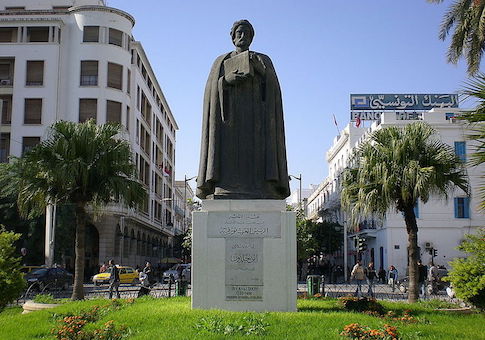Ibn Khaldun (1332-1406) is your favorite historian’s favorite historian and chances are you have never heard his name. Though his principal work, the Muqaddimah (literally the "introduction"), has been pronounced "the most comprehensive and illuminating analysis of how human affairs work that has been made anywhere" by Arnold Toynbee, there are relatively few studies devoted to his philosophic science of history. It is thus a most welcome bit of fortune when a rare book on Ibn Khaldun is published, and more welcome still to discover the book—The Orange Trees of Marrakesh by Stephen Frederic Dale—is an intellectual biography geared toward the non-specialist.
Mr. Dale’s book is important for two reasons. First, it takes pains to place Ibn Khaldun in his historical context. Raised in intellectual, upper class North Africa, Ibn Khaldun became a scholar of Islamic jurisprudence while simultaneously nurturing an interest Greco-Islamic philosophy. Like his two contemporaries, Moses Maimonides and Thomas Aquinas (themselves both influenced by both Greek and Islamic philosophy), Ibn Khaldun’s writing is crucial for understanding the tension between reason and revelation so important to the vitality of the West. Second, Dale’s robust presentation of Ibn Khaldun's thought, especially as encountered in his Muqaddimah, builds the case that his political insights should be rated alongside Aristotle, Montesquieu, Smith, and Durkheim. To give a sense of Ibn Khaldun’s approach to history in the Muqaddimah here are the somewhat ambitious standards he sets himself:
Know the principles of politics, the … nature of existent things, and the differences among nations, places, and periods, with regards to the ways of life, character qualities, customs, sects, schools and everything else. His goal must be to have complete knowledge of the reasons for everything happening and be acquainted with the origin of every event. Then, he must check transmitted information with the basic principles [of nature and accident] he knows.
Ibn Khaldun pursued two goals. He developed a new science of philosophic history and applied this same methodology to interpret the flux of North African and Andalusian history. What results is an immense work of learning that was the first to "analyze the nature of societies in a synchronistic study" rather than a "traditional narrative of events." An apt moniker for Khaldun might be (and has been) the "Montesquieu of the Arabs," though as Dale notes, it is more precise to affirm the reverse.
Part of Ibn Khaldun’ story, usefully pursued by Dale, regards his disappearance from the intellectual world stage. As Dale notes, not one scholar either in the Islamic world or in Europe embraced Ibn Khaldun’s historical methodology. Not only did Ibn Khaldun lack the institutional support to disseminate his ideas, but the Muqaddimah is a notoriously difficult text, presupposing a deep background in Greek thought that would not have been available to the average man in the Arab world. A long lasting consequence of these difficulties was that Europe did not gain exposure to Ibn Khaldun until the late 17th century, and he only became widely known after the 19th. Today, Ibn Khaldun and the Muqaddimah are seen more as "an exotic product of a foreign civilization, rather than as an important milestone in an intellectual tradition that linked Greeks with Muslims and Europeans in a common philosophic culture."
There is one claim Dale makes that, while not fatal to his desire to inspire further Ibn Khaldun studies, has the unfortunate effect of weakening his project. From the outset, Dale bizarrely notes that it is "very important … to emphasize when studying Ibn Khaldun … even though he can rightfully claim to have created a new philosophical science … he was not a philosopher and did not write like one." Since Dale does not do us the service of defining what a philosopher is other than noting other men he calls philosophers—like Avicenna or Hume—"define terms" and "analyze the principles of human nature," we cannot know precisely what he means. If, however, one agrees that Thucydides was more than just a "historian," or Homer more than a simple "poet," then Ibn Khaldun, who bears a striking resemblance to Montesquieu, should be considered among the ranks.
This is an important point to press, especially since it bears on the level of care we aim for in interpretation. If we contend that the Muqaddimah is simply "the history of the world written by an intellectual in the 1300s … much of which … is now disproven after 700 more years of progress," as Mark Zuckerburg recently did when describing the book, then we are approaching Ibn Khaldun’s thought from a poor vantage point, and implying that obscurity is really all he deserves.
While as approachable as one could hope an intellectual biography of a complex thinker, to read The Orange Trees of Marrakesh, it is useful to have some passing acquaintance with the Muqaddimah itself. Fortuitously, the standard English translation by Franz Rosenthal was reissued earlier this year by Princeton. What better time than now to become acquainted with this important thinker.
